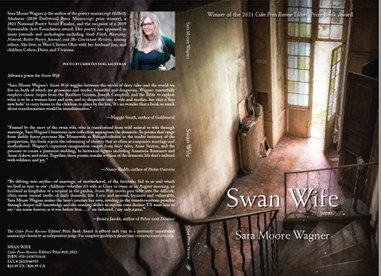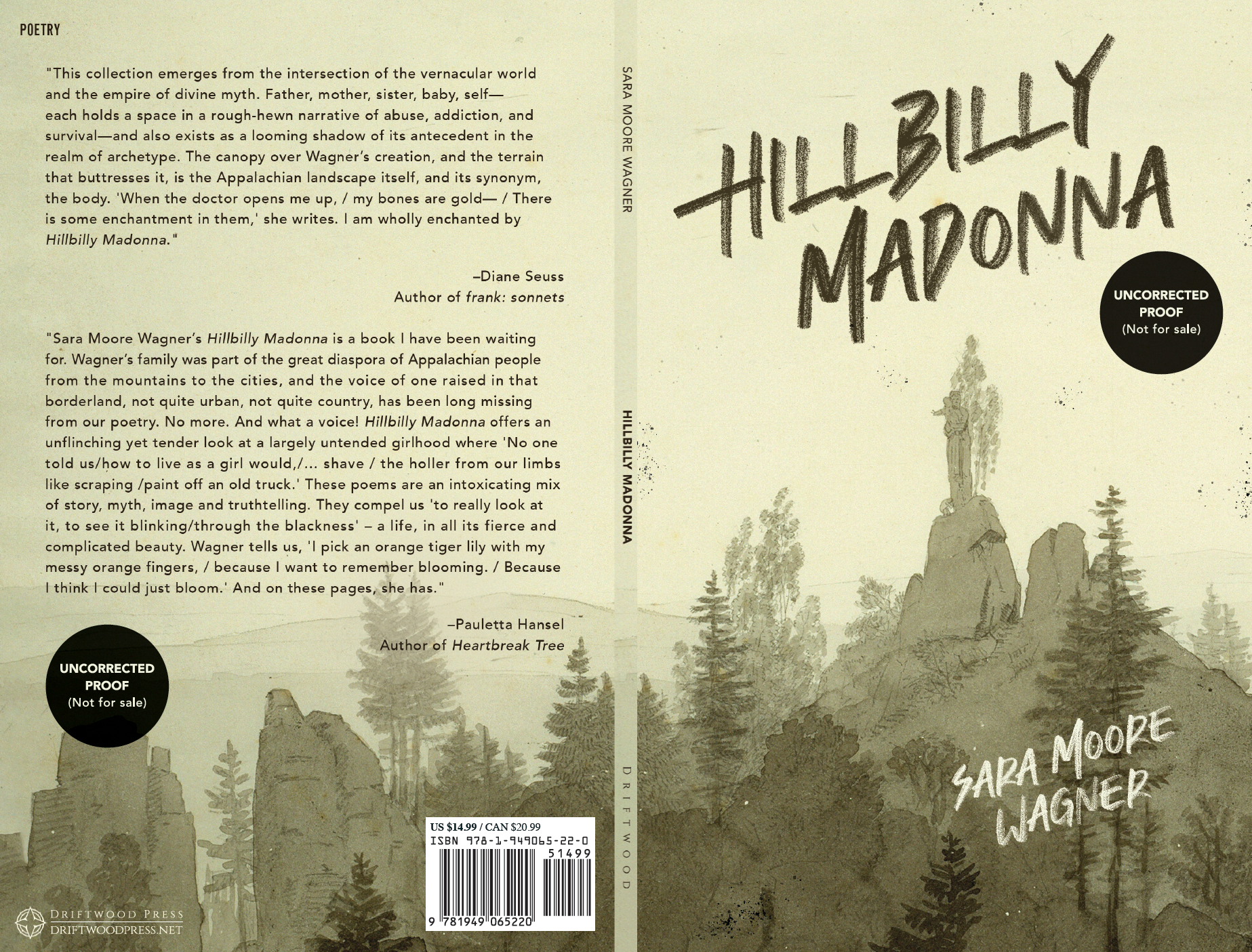Books
AVAILABLE NOW! Order Lady Wing Shot, Winner of the Blue Lynx Prize
Swan Wife (Cider Press Review Editors Prize).
Praise for Swan Wife:
“Sara Moore Wagner’s Swan Wife toggles between the world of fairy tales and the world we live in, both of which are gruesome and tender, beautiful and dangerous. Wagner masterfully employs classic tropes from the Brothers Grimm, Joseph Campbell, and the Bible to explore what is to be a woman here and now, and to shapeshift into a wife and mother, her skin a ‘fine new hide/ to carry home to the children, to place by the fire.’ It’s no wonder that a book so much about transformation would be transformative.”
—Maggie Smith, author of Goldenrod
“Framed by the story of the swan wife, who is transformed from wild animal to wife through marriage, Sara Wagner’s luminous new collection reimagines the domestic. In poems that range from darkly funny personae like ‘Housewife as Rumpelstiltskin’ to the tender intimacy of the postpartum, this book rejects the subsuming of identity that so often accompanies marriage and motherhood. Wagner’s capacious imagination ranges from fairy tales, Anne Sexton, and the pressure to create a ‘pinterest wedding,’ to historical figures including Anastasia Romanov and Anne Askew, and more. Together, these poems remake a vision of the domestic life that’s imbued with wildness and joy. ”
—Nancy Reddy, author of Pocket Universe
“By delving into myths—of marriage, of motherhood, of the fairytales fed to us and which we feed in turn to our children—whether it’s wife as Circe or swan or an August morning, or husband as kingfisher or a serpent in the garden, Swan Wife moves past fable into the difficult, often more surreal truths of daily domestic life. Lyric and sensual, feminist and vulnerable, Sara Moore Wagner makes the hero’s journey her own, reveling in the transformations possible through deeper self-knowledge and the ensuing ability to express your desires: ‘I’ll want him to say / my name forever, as it was before him…. // un-fathered, / my only name.’”
—Jessica Jacobs, author of Pelvis with Distance
Hillbilly Madonna (Driftwood Press)
Praise for Hillbilly Madonna
“Say Dorothy Allison had a baby with Hans Christian Andersen. That ain’t right—I know it, I know—but just say. And say that girl child grows up to wander the tracks, all the while lining up pennies to be smashed on the rails, all the while picking up shed antlers and discarded needles along the berm. And say here comes a fast train, a Christ-haunted train, a train heavy with the freight of West Virginia, a cargo of such great violence and great tenderness that you know the girl is standing far, far too close to all that’s barreling past. She stands so close the force of it blows back her hair; she stands so close you’re sure she’ll get hit and won’t survive. But she doesn’t step back. No, she stands her ground. This, dear reader, is Sara Wagner, writing this book. These poems ache and ache and ache, but not once do they flinch. Read them and prepare yourself to be wrung out, to be redeemed, to be fit to be tied.”
— Nickole Brown, author of To Those Who Were Our First God
"This collection emerges from the intersection of the vernacular world and the empire of divine myth. Father, mother, sister, baby, self—each holds a space in a rough-hewn narrative of abuse, addiction, and survival—and also exists as a looming shadow of its antecedent in the realm of archetype. The canopy over Wagner’s creation, and the terrain that buttresses it, is the Appalachian landscape itself, and its synonym, the body. 'When the doctor opens me up, / my bones are gold— / There is some enchantment in them,' she writes. I am wholly enchanted by Hillbilly Madonna."
— Diane Seuss, Winner of the Pulitzer Prize for Frank: Sonnets
"Sara Moore Wagner’s Hillbilly Madonna is a book I have been waiting for. Wagner’s family was part of the great diaspora of Appalachian people from the mountains to the cities, and the voice of one raised in that borderland, not quite urban, not quite country, has been long missing from our poetry. No more. And what a voice! Hillbilly Madonna offers an unflinching yet tender look at a largely untended girlhood where 'No one told us/how to live as a girl would,/… shave / the holler from our limbs like scraping /paint off an old truck.' These poems are an intoxicating mix of story, myth, image and truthtelling. They compel us 'to really look at it, to see it blinking/through the blackness' – a life, in all its fierce and complicated beauty. Wagner tells us, 'I pick an orange tiger lily with my messy orange fingers, / because I want to remember blooming. / Because I think I could just bloom.' And on these pages, she has.
— Pauletta Hansel, Author of Heartbreak Tree
Hooked Through (Five Oaks Press, 2017)
About Hooked Through
Sara Wagner’s poems reveal an astonishing idea of interiority. And the exterior world is no less odd, as this poet perceives it: “Listen to the sound of the moon whisk / through the sky like a thrown pumpkin.” The surreality of these poems is rooted, though, in the real, with the loss of the poet’s grandfather to a violent suicide serving as the spark that ignites the charge. As Wagner writes in “After the Burial,” in a moment where she visits a creek with her child, “One day we’ll catch our deaths // with cupped hands, / as we do the avalanche / of minnows.” Wagner has looked deep inside of us, and she has found piles of dust, fragments of tooth, the occasional skittering animal, and, most ominously, a barbed hook, always pulling us from our element into another, even as we try to resist. Her heartbreakingly innovative thinking about loss kept me on the line, and ultimately reeled me in.
—Karen Craigo, author of the poetry collection No More Milk (Sundress, 2016) & blogger at Better View of the Moon
Hooked Through studies violence—of suicide, of nature, of our “possum heart,” of our “last days.” Anything can destroy, deconstruct, or devour the body—teeth, tongues, bullets, bugs, the sun—and the body grows, hatches, disappears and transforms into jerking flesh on a hook or fingers into stems or a spine into a tree or bones into “a single word.” And yet the speaker, while forcibly fragmented, survives and is able to discern the smallest beauty like the outline of a wing, birds leaving an “empty chest,” a pretty “sliver of sky” that can be fed on. When I read Sara Moore Wagner’s poetry, I am forced to re-examine all I thought I knew. This is haunting, magical, brave work from a poet of great power, and I am thankful her poems exist—a true voice of her post-9/11 generation.
—Kelly Moffett, author of Bird Blind (Tebot Bach, 2017) & others





